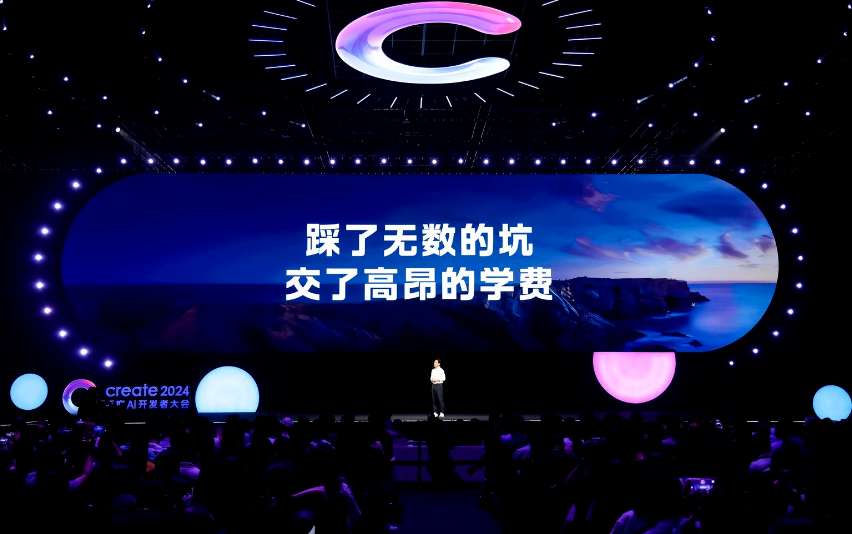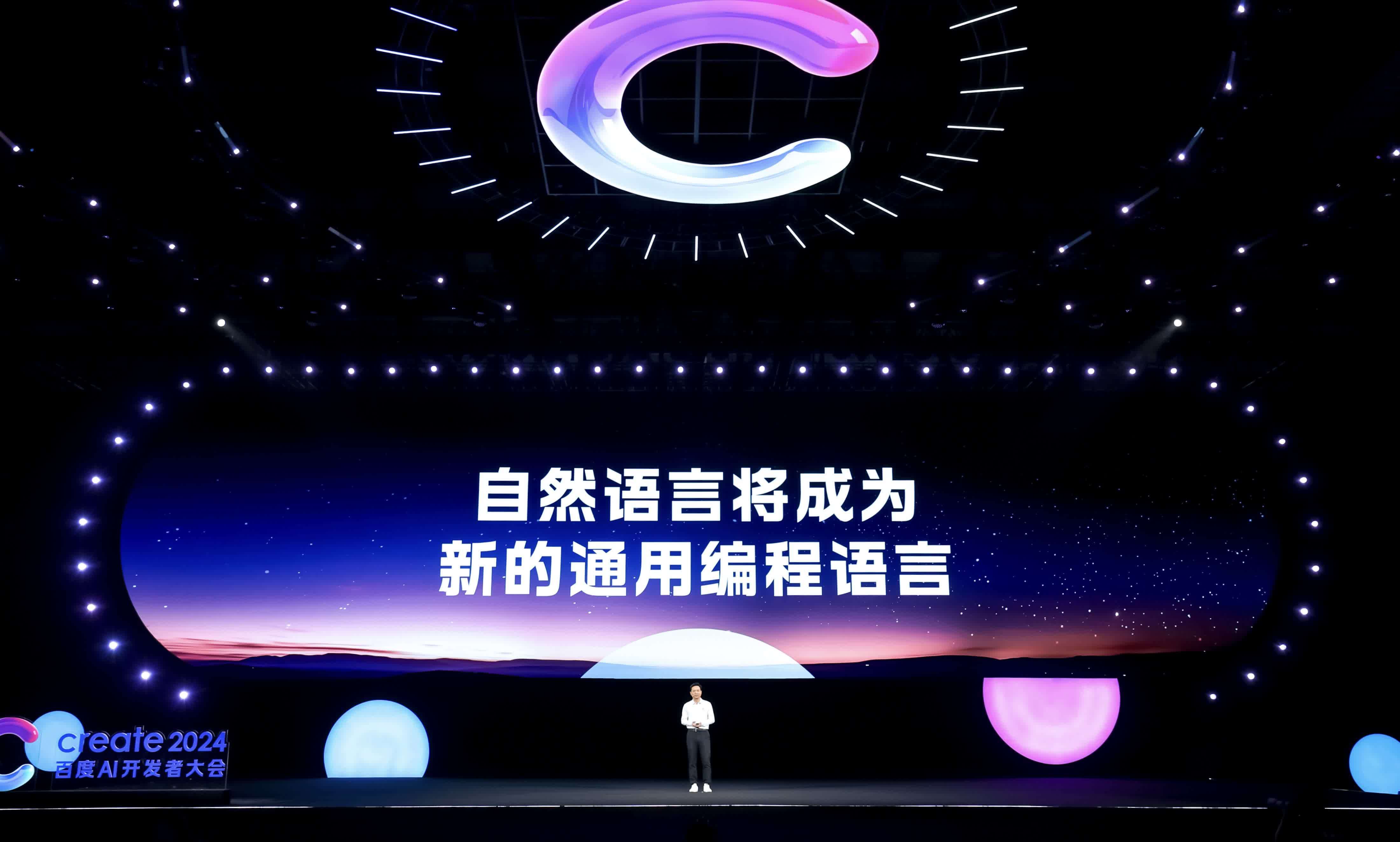With Developer Surges, Closed-Source Brings Baidu Money
On April 16th, at the Create 2024 Baidu AI Developer Conference, Baidu's founder, chairman and CEO Robin Li said, "In the future, developing an app will be as easy as taking a short video, everyone can be a developer."
On April 16th, at the Create 2024 Baidu AI Developer Conference, Baidu's founder, chairman, and CEO, Robin Li, delivered a keynote speech titled "Everyone is a Developer." He pointed out, "AI is sparking a creativity revolution, where natural language will become the new universal programming language, and in the future, developing applications will be as simple as taking a short video, everyone can be a developer."
Today, owing to increasingly powerful foundational LLMs, developers' productivity has significantly increased. For instance, Comate, an intelligent code assistant based on the ERNIE LLM, has entered over tens of thousands of enterprises such as Ximalaya, Mitsubishi Elevator, and Softcom Power within just over a year. Of the code generated daily by Baidu, 27% is already produced by Comate.

Multiple AI Tools released
At the conference, Baidu shared three "ready-to-use" AI development tools, including the AgentBuilder for intelligent agent development, the AppBuilder for native AI application development, and the ModelBuilder for model customization in various sizes.
AgentBuilder: Intelligent Agent Development
On the spot, Robin Li demonstrated three intelligent agent cases from the Singapore Tourism Board, New Oriental Education and Sophia.
New Oriental Education, using Baidu's AgentBuilder, achieved 1.55 million distributions and 58,000 user interactions in the first week of launch. The conversion of leads increased linearly, and the cost of converting effective leads significantly decreased, leading to a substantial improvement in operational efficiency. Meanwhile, Sophia's merchant intelligent agent reduced the cost of effective leads by 30% since its launch.
With the help of Baidu's AgentBuilder, every merchant and user can easily have their own exclusive intelligent agent. Robin Li believes that intelligent agents may be the closest and most mainstream way for everyone to use LLMs in the future. Based on powerful base models, intelligent agents can be generated in batches and applied in various scenarios. As of now, over 30,000 intelligent agents have been created, with over 50,000 developers and tens of thousands of companies joining.
AppBuilder: Native AI Application Development
Baidu claims that the AppBuilder introduced this time is the "most user-friendly" AI native application development tool, with two absolute advantages:
Powerful functionality. Leveraging ERNIE 4.0's understanding and compliance with instructions, AppBuilder can ensure running effects even in cold start situations. Moreover, with Retrieval-Augmented Generation (RAG) technology, the tool achieves an accuracy and friendliness of over 95%, far exceeding similar products.
Easy to use. Baidu has pre-packaged and pre-set various components and frameworks required for developing AI native applications in AppBuilder, significantly reducing the development threshold. With just natural language input and three steps (setting names, filling role instructions, inserting components), you can quickly create applications and distribute them with one click. It also supports open-source SDK for easy secondary development.
ModelBuilder: Model Customization
Baidu states that ModelBuilder is a "highly efficient and low-cost model production tool" specifically developed for professional developers. It can customize models of any size according to developers' needs and further fine-tune SFT according to specific scenarios to achieve better results.
During the conference, Robin Li specifically showcased the tool's specific application in the education and training industry. The "essay correction assistant" after data processing and model fine-tuning is not only more professional in teacher evaluation and format correction but also closer to real scores than untuned models.
In addition to the above three new products, Shen Dou, Executive Vice President of Baidu Group and President of Baidu Intelligent Cloud Business Group, also released Baidu Intelligent Cloud's new generation of intelligent computing operating system, Wan Yuan. This system is compatible with various LLMs and can fully meet the industry's demand for LLM usage.
"Baidu stepped on countless pits."
Regarding Baidu's specific approach to developing AI native applications based on LLMs, Robin Li said, "This is based on Baidu's practice over the past years, stepping on countless pits and high tuition fees paid."

The first is MoE. Robin Li believes that in the future, large-scale AI native applications will basically adopt the MoE architecture (a mix of large and small models), thereby relieving a model from the predicament of "fighting alone."
The second is small models. Small models with low inference costs and fast response speeds, after specific fine-tuning, can fully rival large models. Therefore, Baidu successively released three lightweight models: Speed, Lite and Tiny.
The third is intelligent agents. With the improvement of the capabilities of intelligent agents (understanding, planning, reflection, and evolution), more and more AI native applications will emerge. They can autonomously complete complex tasks, continue learning in the environment, achieve self-iteration and evolution. In complex environments, they can even cooperate with each other to accomplish tasks with high quality.
Baidu AI and LLMs' New Trends
According to the released data, since the launch of ERNIE on March 16th last year, the number of users has exceeded 200 million, and the daily API calls have also exceeded 200 million. It serves 85,000 customers, and there are over 190,000 AI native applications on the Qianfan platform. In his view, ERNIE has become China's leading and most widely used AI basic model.
In the past year, ERNIE's LLM has been upgraded from 3.0 to 3.5, and then to version 4.0. This version has reached the industry-leading level in four key aspects: understanding, generation, logic, and memory. Specifically, the algorithm training efficiency of ERNIE 4.0 has increased by 5.1 times compared to the previous version, with a weekly training effective time of up to 98.8%. Inference performance has increased by 105 times, and costs have decreased to 1% of the original. That is to say, customers who originally made 10,000 calls a day can now make 1 million calls at the same cost.
In response to this development, the ERNIE LLM 4.0 Tool Edition officially debuted at the conference. This version introduces a code interpreter function, which can process and analyze complex data and files through natural language interaction, and generate corresponding graphical files, thus quickly insight into data characteristics, analyze changes, and provide support for subsequent decisions.
However, Robin Li believes that open-source models will become increasingly outdated.
"With ERNIE 4.0, Baidu can tailor smaller models suitable for various scenarios according to needs, taking into account factors such as effectiveness, response speed, and inference costs, and support fine-tuning and post-pretraining. Compared to models directly derived from open-source models, models pruned through dimension reduction perform better and cost less at the same size," explained Robin Li.
From the way he sees it, LLMs themselves do not directly create value, and AI applications developed based on LLMs are what can truly meet market demand, and closed-source is the real path to profitability.

·Original
Disclaimer: The views in this article are from the original Creator and do not represent the views or position of Hawk Insight. The content of the article is for reference, communication and learning only, and does not constitute investment advice. If it involves copyright issues, please contact us for deletion.